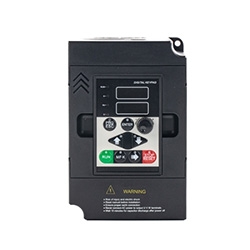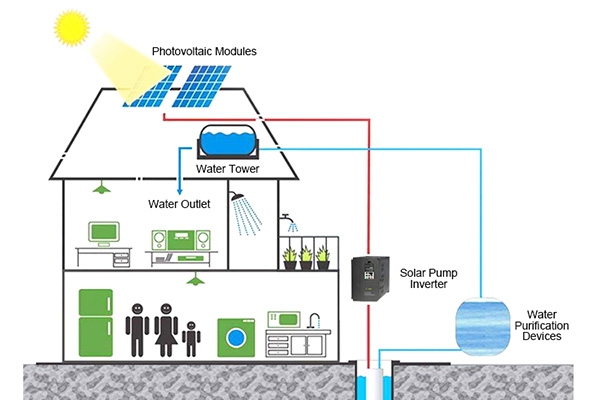As global attention to renewable energy increases, the application fields of solar energy, as a clean and renewable energy source, constantly expand. As the core component of solar water pump systems, the performance and adaptability of solar pump inverters to different environments are crucial for the stable operation of the entire system. Today we will explore applying solar water pump inverters in various environments, analyzing their technical characteristics, challenges, and solutions.
Basic Principle of Solar Pump Inverters
A solar pump inverter is a key device that converts the direct current generated by solar PV panels into alternating current to drive the water pump. It mainly consists of a rectifier, filter, inverter, and control circuit. The rectifier converts the direct current output from the solar panels into pulsating direct current. The filter is used to remove the high-frequency components in the pulsating direct current, making the output current smoother. The inverter converts the filtered direct current into alternating current and achieves precise control of the water pump through the control circuit.
Applications of Solar Pump Inverters in Different Environments
1. Agricultural Irrigation: In the field of agricultural irrigation, solar water pump inverters have broad application prospects. Traditional irrigation methods often rely on grid power, but in remote areas or places where the grid is not accessible, solar pump inverters can fully utilize solar resources to achieve self-sufficient irrigation systems. Additionally, solar water pump inverters can flexibly adjust irrigation times and amounts based on crop growth needs, improving irrigation efficiency. They also provide a stable power supply for irrigation systems. Farmers can use solar panels to capture sunlight, convert it into electricity, and drive water pumps through inverters to draw groundwater or river water for field irrigation. This system not only saves energy costs but also reduces dependence on fossil fuels and lowers carbon emissions.
improving irrigation efficiency. They also provide a stable power supply for irrigation systems. Farmers can use solar panels to capture sunlight, convert it into electricity, and drive water pumps through inverters to draw groundwater or river water for field irrigation. This system not only saves energy costs but also reduces dependence on fossil fuels and lowers carbon emissions.
2. Aquaculture: In aquaculture, water quality management and oxygen supply equipment need to operate continuously. Solar water pump inverters can provide stable power for these devices, ensuring that the water quality in the breeding ponds remains in good condition. This application not only reduces operating costs but also improves breeding efficiency and yield.
3. Mountain Water Supply: In the field of mountain water supply, solar water pump inverters also play an important role. Due to the complex terrain and the difficulty of grid construction in mountainous areas, traditional water supply methods often fail to meet the demand. Solar water pumping inverters can fully utilize the abundant solar resources in mountainous areas to achieve efficient and stable water supply systems. Moreover, they can rationally layout pump stations according to the distribution of water resources in the mountains, ensuring the reliability and economy of the water supply system.
4. Extreme Climate Areas: In extreme climate areas, such as those with high cold, high heat, and high humidity, the application of solar water pump inverters also faces certain challenges. The harsh climate conditions in these areas pose higher requirements for the performance and reliability of solar water pump inverters. However, through the adoption of advanced cooling technologies, waterproof materials, and weather-resistant materials, the adaptability and stability of solar water pump inverters in extreme climate environments can be effectively improved.
5. Island Development: In island development, solar water pump inverters also have broad application prospects. Islands are often isolated and difficult to connect to the grid, but they have abundant solar resources. Solar water pump inverters can fully utilize the solar resources on islands to provide stable and reliable water supply systems for island residents. Additionally, solar water pump inverters can be combined with seawater desalination equipment to provide fresh water resources for island residents.
6. Industrial Water Use: Many industrial processes require large amounts of water, such as cooling in production processes, cleaning, and product processing. Solar water pump inverters can provide power for these water treatment systems, ensuring efficient use of water resources. Compared to traditional energy sources, solar systems have lower operating costs and better environmental friendliness. In industrial cooling systems, water pumps are used to circulate cooling water to lower equipment temperatures. Solar water pump inverters can provide stable power for these pumps, ensuring efficient operation of the cooling system and preventing equipment overheating and damage. This application not only saves energy costs but also improves the reliability of equipment operation.
7. Desert Control: In desert control, solar-powered pump inverters, such as the 0.75 kW solar pump inverter sold on Inverter.com also have significant application value. Desert areas have dry climates and scarce water resources, and traditional control methods often fail to achieve notable results. Solar pump inverters can use solar energy to drive water pumps to extract groundwater or river water, providing valuable water resources for desert areas. Through reasonable irrigation and vegetation restoration measures, the ecological environment and climate conditions in desert areas can be effectively improved.

Challenges and Solutions for Solar Pump Inverters
- Efficient Conversion: Solar water pump inverters need to achieve efficient energy conversion to maximize the utilization of solar energy. To achieve this goal, advanced power conversion technologies, and control algorithms can be adopted to optimize the design and manufacturing processes of the inverters. Additionally, intelligent control systems can be used to monitor and adjust the inverters in real time, ensuring they always operate at their optimal state.
- Reliability Assurance: In harsh environments, the reliability of solar water pump inverters is especially crucial. To ensure the stable operation of the inverters, high-quality components and materials should be used, and strict testing and validation should be conducted. Moreover, a comprehensive after-sales service system and technical support system should be established to provide users with timely and professional technical support and service guarantees.
- Cost Control: The cost of solar water pump inverters is also a significant factor affecting their widespread application. To reduce the cost of inverters, modular design, standardized production, and automated manufacturing technologies can be employed. Additionally, optimizing supply chain management, reducing manufacturing costs, and improving production efficiency can further lower the cost of inverters.
As the core component of solar water pump systems, the performance and environmental adaptability of solar water pump inverters are crucial for the stable operation of the entire system. With continuous technological advancements and the expansion of application fields, solar water pump inverters will play an increasingly important role in more areas. Inverter Online Shop offers a variety of models of solar water pump inverters to meet your different needs. In the future, we look forward to the emergence of more efficient, reliable, and economical solar water pump inverter products, contributing significantly to sustainable human development.
